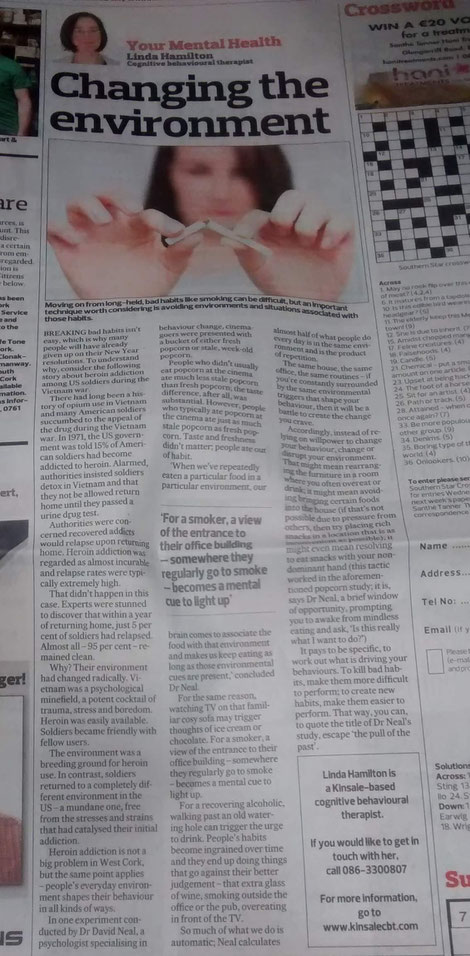
How can we break bad habits? Last week's Your Mental Health column in The Southern Star discussed how changing your environment in all kinds of subtle ways can help. The column is reproduced below.
Breaking bad habits isn’t easy, which is why many people will have already given up on their New Year resolutions. To understand why, consider the following story about heroin addiction among US soldiers during the Vietnam war.
There had long been a history of opium use in Vietnam and many American soldiers succumbed to the appeal of the drug during the Vietnam war. In 1971, the US government was told 15 per cent of American soldiers had become addicted to heroin. Alarmed, authorities insisted soldiers detox in Vietnam and that they not be allowed return home until they passed a urine drug test.
Authorities were concerned recovered addicts would relapse upon returning home. Heroin addiction was regarded as almost incurable and relapse rates were typically extremely high.
That didn’t happen in this case. Experts were stunned to discover that within a year of returning home, just 5 per cent of soldiers had relapsed. Almost all – 95 per cent – remained clean.
Why? Their environment had changed radically. Vietnam was a psychological minefield, a potent cocktail of trauma, stress and boredom. Heroin was easily available. Soldiers became friendly with fellow users. The environment was a breeding ground for heroin use. In contrast, soldiers returned to a completely different environment in the US – a mundane one, free from the stresses and strains that had catalysed their initial addiction.
Heroin addiction is not a big problem in West Cork, but the same point applies – people’s everyday environment shapes their behaviour in all kinds of ways. In one experiment conducted by Dr David Neal, a psychologist specialising in behaviour change, cinema-goers were presented with a bucket of either fresh popcorn or stale, week-old popcorn. People who didn’t usually eat popcorn at the cinema ate much less stale popcorn than fresh popcorn; the taste difference, after all, was substantial. However, people who typically ate popcorn at the cinema ate just as much stale popcorn as fresh popcorn. Taste and freshness didn’t matter; people ate out of habit (continued below...)
ENVIRONMENT SHAPES BEHAVIOUR
“When we’ve repeatedly eaten a particular food in a particular environment, our brain comes to associate the food with that environment and make us keep eating as long as those environmental cues are present”, concluded Dr Neal. For the same reason, watching TV on that familiar cosy sofa may trigger thoughts of ice cream or chocolate. For a smoker, a view of the entrance to their office building – somewhere they regularly go to smoke – becomes a mental cue to light up. For a recovering alcoholic, walking past an old watering hole can trigger the urge to drink. People’s habits become ingrained over time and they end up doing things that go against their better judgement – that extra glass of wine, smoking outside the office or the pub, overeating in front of the TV.
AUTOMATIC BEHAVIOUR
So much of what we do is automatic; Neal calculates almost half of what people do every day is in the same environment and is the product of repetition. The same house, the same office, the same routines – if you’re constantly surrounded by the same environmental triggers that shape your behaviour, then it will be a battle to create the change you crave.
Accordingly, instead of relying on willpower to change your behaviour, change or disrupt your environment. That might mean rearranging the furniture in a room where you often overeat or drink; it might mean avoiding bringing certain foods into the house (if that’s not possible due to pressure from others, then try placing rich snacks in a location that is as inconvenient as possible); it might even mean resolving to eat snacks with your non-dominant hand (this tactic worked in the aforementioned popcorn study; it is, says Dr Neal, a brief window of opportunity, prompting you to awake from mindless eating and ask, “Is this really what I want to do?”)
It pays to be specific, to work out what is driving your behaviours. To kill bad habits, make them more difficult to perform; to create new habits, make them easier to perform. That way, you can, to quote the title of Dr Neal’s study, escape “the pull of the past”.